
Seoul (TIP): North Korean leader Kim Jong Un visited a new city being built near the border with China and a sacred mountain revered by his family, state media reported on Tuesday, in his first public appearance in more than a month. The northern alpine town of Samjiyon is being transformed into a massive economic hub, called a “socialist utopia by officials, equipped with new apartments, hotels, a ski resort and commercial, cultural and medical facilities.
The developing city is near Mount Paektu, the holy mountain where Kim’s family claims its roots, and he has made multiple visits since 2018, with the official KCNA news agency touting it as “epitome of modern civilisation.”
KCNA said Kim’s latest trip was designed to inspect the third and last phase of construction, due to be completed by the end of this year after delays caused by international sanctions and the coronavirus pandemic.
KCNA did not give a date for Kim’s visit, but it is the first report of public activity by the leader for 35 days, since he gave a speech at a defence exhibition, his longest absence since 2014.
The young, reclusive leader’s disappearance from state media often sparks speculation over his health or whereabouts. South Korea‘s intelligence agency said late last month that he had no health issues.
“He said Samjiyon has turned into an example of a mountainous modern city under socialism and a standard of rural development thanks to the workers’ steadfast struggle despite the unfavourable northern environment,” KCNA said.
Kim said building the new city provided experience in construction, design and technologies that would boost economic growth for other regions.
The city is one of the largest initiatives Pyongyang has launched as part of Kim’s push for a “self-reliant” economy as the country faces international sanctions over its nuclear and missile programmes.
Nearly two years after sealing borders to head off Covid-19, North Korea has recently resumed rail freight with China, the latest sign that they could reopen the border soon. Reuters





Be the first to comment